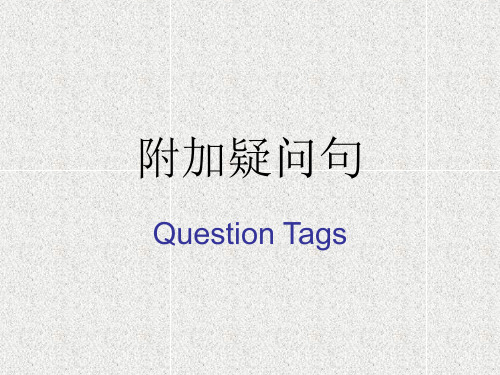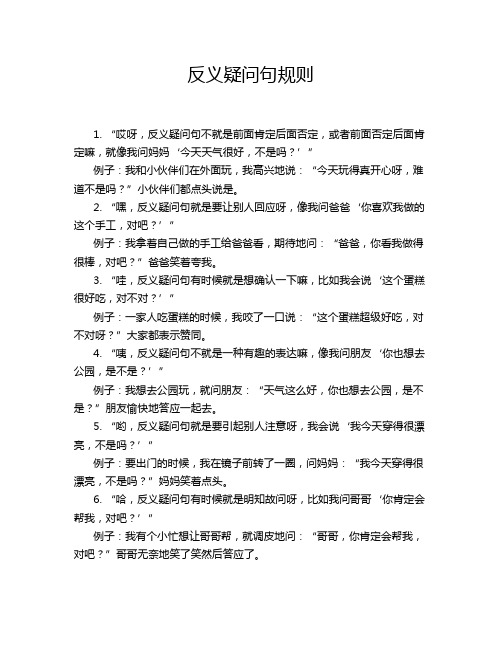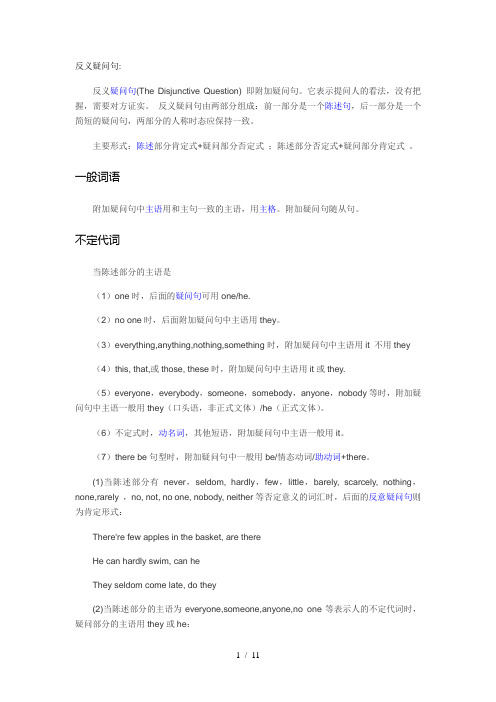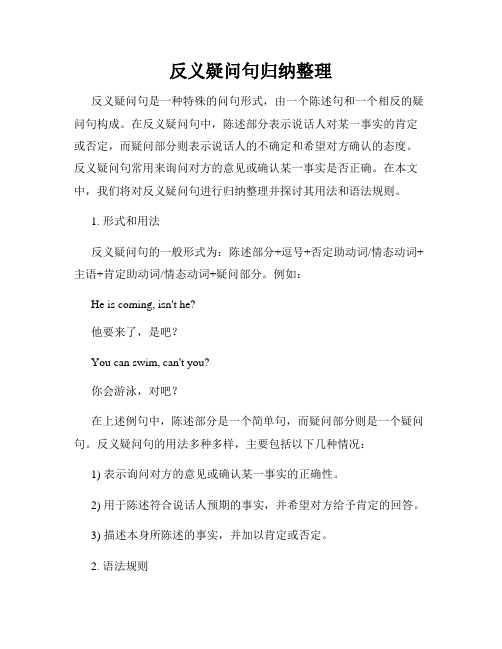反义疑问句整理
反义疑问句的例句

反义疑问句的例句反义疑问句是英语语法中常用的一种疑问句形式。
它由一个陈述句和一个简略的疑问句构成,用于询问对方是否同意或不同意陈述句的内容。
1. He's not going to the party, is he?2. You don't like coffee, do you?3. They won't be late, will they?4. She can swim, can't she?5. He didn't finish his homework, did he?6. You haven't seen the movie, have you?7. She will call you later, won't she?8. He shouldn't eat too much, should he?9. They couldn't find the keys, could they?10. You haven't been to Paris, have you?11. She isn't coming with us, is she?12. You won't forget to pick up the groceries, will you?13. He doesn't know the answer, does he?14. They didn't win the game, did they?15. You can't speak French, can you?16. She hasn't finished her work, has she?17. He will be on time, won't he?18. They shouldn't eat junk food, should they?19. You couldn't find your passport, could you?20. She isn't feeling well today, is she?21. He has never been to Japan, has he?22. You won't be late for the meeting, will you?23. They didn't enjoy the concert, did they?24. She doesn't like spicy food, does she?25. He hasn't watched the movie, has he?26. You will help me with the project, won't you?27. She shouldn't drive in that condition, should she?28. They couldn't solve the problem, could they?29. You haven't finished reading the book, have you?30. She isn't going on vacation, is she?31. He didn't invite her to the party, did he?32. You don't need any help, do you?33. They won't miss the train, will they?34. She can play the piano, can't she?35. He didn't attend the meeting, did he?36. You haven't seen that TV show, have you?37. She will pass the exam, won't she?38. They shouldn't drink alcohol and drive, should they?39. You couldn't find your keys, could you?40. She isn't interested in sports, is she?以上是一些常见的反义疑问句的例句,可以帮助你更好地理解和运用这种语法结构。
反义疑问句(最全)

5.陈述部分有would rather +v.,疑问部分多用 wouldn’t +主语。 He would rather read it ten times than recite it, wouldn’t he? 6.陈述部分有you’d like to +v. 疑问部分用wouldn’t + 主语。 You’d like to go with me, wouldn’t you? 7.陈述部分是“there be”结构时,疑问部分用there省 略主语代词。 There is something wrong with your watch, isn't there? There will not be any trouble, will there? Note: 当为“ there used to be…”句型时,反意问句用 didn’t there。
b. 带有定语从句,宾语从句的主从复合句,疑问部分谓 语根据主句的谓语而定 He is not the man who gave us a talk, is he? He said he wanted to visit Japan, didn’t he?
c. 上述部分主句是由谓语think, believe, expect, suppose, imagine等引导的宾语从句,疑问部分与宾语 从句相对应构成反意疑问句 I don't think he is bright, is he? We believe she can do it better, can't she? Note: 但此时主语必须是第一人称。如果不是,则不能否定从 句。 He thought she was wrong, didn't he? 而不能说wasn't she?
反义疑问句的用法归纳及回答举例

反义疑问句的用法归纳及回答举例
1. 哎呀呀,反义疑问句就是在陈述句后面加上一个简短问句呀!比如“你喜欢看书,不是吗?”,这里就是先陈述“你喜欢看书”,然后问“不是吗”。
2. 咱要注意哦,如果前面陈述句是肯定的,后面的反义疑问句就要用否定形式呢。
就像“他很聪明,不是吗?”。
3. 反过来,如果前面是否定陈述句,那后面的反义疑问句就得是肯定的啦!比如“她今天没来,对吧?”。
4. 回答的时候可别糊涂呀!要是同意就说“是呀”或“对呀”,不同意就直接说“不是”。
就好像人家问“今天天气不错,不是吗?”,觉得对就说“是呀”。
5. 有时还会遇到特殊情况呢,像“Let's go shopping,shall we?”这时候就得用“shall we”呀。
6. 还有那种祈使句的反义疑问句呢,“别跑太快,好吗?”就是一种呀。
7. 哎呀,这反义疑问句用法不复杂吧,一学就会啦!就像学骑自行车,掌握了技巧就没问题啦!
8. 记住这些要点,以后再遇到反义疑问句就不怕啦!反义疑问句其实挺好玩的呀,能让我们的交流更有趣不是吗?我觉得掌握反义疑问句真的很有用,能让我们的表达更丰富呢。
反义疑问句规则

反义疑问句规则1. “哎呀,反义疑问句不就是前面肯定后面否定,或者前面否定后面肯定嘛,就像我问妈妈‘今天天气很好,不是吗?’”例子:我和小伙伴们在外面玩,我高兴地说:“今天玩得真开心呀,难道不是吗?”小伙伴们都点头说是。
2. “嘿,反义疑问句就是要让别人回应呀,像我问爸爸‘你喜欢我做的这个手工,对吧?’”例子:我拿着自己做的手工给爸爸看,期待地问:“爸爸,你看我做得很棒,对吧?”爸爸笑着夸我。
3. “哇,反义疑问句有时候就是想确认一下嘛,比如我会说‘这个蛋糕很好吃,对不对?’”例子:一家人吃蛋糕的时候,我咬了一口说:“这个蛋糕超级好吃,对不对呀?”大家都表示赞同。
4. “咦,反义疑问句不就是一种有趣的表达嘛,像我问朋友‘你也想去公园,是不是?’”例子:我想去公园玩,就问朋友:“天气这么好,你也想去公园,是不是?”朋友愉快地答应一起去。
5. “哟,反义疑问句就是要引起别人注意呀,我会说‘我今天穿得很漂亮,不是吗?’”例子:要出门的时候,我在镜子前转了一圈,问妈妈:“我今天穿得很漂亮,不是吗?”妈妈笑着点头。
6. “哈,反义疑问句有时候就是明知故问呀,比如我问哥哥‘你肯定会帮我,对吧?’”例子:我有个小忙想让哥哥帮,就调皮地问:“哥哥,你肯定会帮我,对吧?”哥哥无奈地笑了笑然后答应了。
7. “呐,反义疑问句就是这样的啦,像我问妹妹‘你也喜欢看动画片,是不是?’”例子:我和妹妹在看电视,我问她:“你也喜欢看动画片,是不是?”妹妹开心地说喜欢。
8. “嘿呀,反义疑问句能让对话更有意思呢,我会说‘你不会不喜欢吃冰淇淋吧?’”例子:我拿着冰淇淋问小伙伴:“这么好吃的冰淇淋,你不会不喜欢吃吧?”小伙伴赶紧说喜欢。
9. “哎呀呀,反义疑问句就是这样特别呀,像我问奶奶‘您最疼我了,对吧?’”例子:我依偎在奶奶身边,撒娇地问:“奶奶,您最疼我了,对吧?”奶奶满脸慈爱地说是。
10. “哇塞,反义疑问句可太有用啦,比如我问同学‘明天要上学,对吧?’”例子:放学的时候,我和同学讨论,我说:“明天要上学,对吧?”同学也说是呀。
反义疑问句的句型

反义疑问句的句型
1. 你知道“今天天气真好,不是吗?”这就是一个反义疑问句呀!比如大家一起出去玩,有人说“这地方真好玩啊”,然后接着来一句“不是吗”,是不是感觉很自然?
2. 难道你没听过“他很厉害,对吧?”这种句子吗?就像朋友在你面前展示一项技能,然后问你“我厉害吧,对吧?”。
3. “你应该会做饭,不是吗?”,这太常见啦!就像妈妈问孩子“你都这么大了,应该会做饭,不是吗?”。
4. 有没有觉得“那本书很有趣,不是吗?”这样的反义疑问句很亲切?比如在读书分享会上,有人推荐一本书后说“那本书真的很有趣,不是吗?”。
5. “你喜欢这部电影,对吧?”,哎呀,这不就是我们平时会说的嘛!像和朋友看完电影后会问“你喜欢这部电影,对吧?”。
6. “这件衣服很漂亮,不是吗?”多形象啊!比如在服装店试衣服,自己会说“这件衣服很漂亮,不是吗?”。
7. “你不会生气了吧,不是吗?”,这种时候常常会这么问呀!就像和朋友开玩笑后担心他生气,就会问一句“你不会生气了吧,不是吗?”。
8. “这个蛋糕很好吃,对吧?”,想想在吃蛋糕的时候,是不是很容易就说出这句话呢!
9. “他肯定能做好,不是吗?”,就好像对别人充满信心时会说“他那么厉害,肯定能做好,不是吗?”。
10. “你已经准备好了,对吧?”,比如要去参加一个活动,会问伙伴“你已经准备好了,对吧?”。
我的观点结论:反义疑问句在我们的日常交流中真的太常见啦,它能让对话更自然、更亲切,也能更好地表达我们的情感和态度。
反义疑问句知识点

反义疑问句:反义疑问句(The Disjunctive Question) 即附加疑问句。
它表示提问人的看法,没有把握,需要对方证实。
反义疑问句由两部分组成:前一部分是一个陈述句,后一部分是一个简短的疑问句,两部分的人称时态应保持一致。
主要形式:陈述部分肯定式+疑问部分否定式;陈述部分否定式+疑问部分肯定式。
一般词语附加疑问句中主语用和主句一致的主语,用主格。
附加疑问句随从句。
不定代词当陈述部分的主语是(1)one时,后面的疑问句可用one/he.(2)no one时,后面附加疑问句中主语用they。
(3)everything,anything,nothing,something时,附加疑问句中主语用it 不用they(4)this, that,或those, these时,附加疑问句中主语用it或they.(5)everyone,everybody,someone,somebody,anyone,nobody等时,附加疑问句中主语一般用they(口头语,非正式文体)/he(正式文体)。
(6)不定式时,动名词,其他短语,附加疑问句中主语一般用it。
(7)there be句型时,附加疑问句中一般用be/情态动词/助动词+there。
(1)当陈述部分有never,seldom, hardly,few,little,barely, scarcely, nothing,none,rarely ,no, not, no one, nobody, neither等否定意义的词汇时,后面的反意疑问句则为肯定形式:There're few apples in the basket, are thereHe can hardly swim, can heThey seldom come late, do they(2)当陈述部分的主语为everyone,someone,anyone,no one等表示人的不定代词时,疑问部分的主语用they或he:Everyone in your family is a teacher, aren’t they\isn't he?(3)当陈述部分的主语为everything,something,anything.nothing等表示物的不定代词时,疑问部分的主语用it:Something is wrong with your watch, isn’t it(4)当陈述部分含有否定意思的词是unhappy,dislike,unfriendly,等含有否定词缀的派生词,也就是有un,dis,no-前缀、-less后缀等含有词缀而意思否定的词,当做肯定句处理,疑问部分要用否定形式。
反义疑问句归纳整理

反义疑问句归纳整理反义疑问句是一种特殊的问句形式,由一个陈述句和一个相反的疑问句构成。
在反义疑问句中,陈述部分表示说话人对某一事实的肯定或否定,而疑问部分则表示说话人的不确定和希望对方确认的态度。
反义疑问句常用来询问对方的意见或确认某一事实是否正确。
在本文中,我们将对反义疑问句进行归纳整理并探讨其用法和语法规则。
1. 形式和用法反义疑问句的一般形式为:陈述部分+逗号+否定助动词/情态动词+主语+肯定助动词/情态动词+疑问部分。
例如:He is coming, isn't he?他要来了,是吧?You can swim, can't you?你会游泳,对吧?在上述例句中,陈述部分是一个简单句,而疑问部分则是一个疑问句。
反义疑问句的用法多种多样,主要包括以下几种情况:1) 表示询问对方的意见或确认某一事实的正确性。
2) 用于陈述符合说话人预期的事实,并希望对方给予肯定的回答。
3) 描述本身所陈述的事实,并加以肯定或否定。
2. 语法规则在构成反义疑问句的过程中,需要遵循一些语法规则,以确保句子的正确性和逻辑性。
2.1 句子主语在反义疑问句中,疑问部分的主语通常与陈述部分一致。
例如:She likes ice cream, doesn't she?她喜欢冰淇淋,对吧?You have finished your homework, haven't you?你完成了作业,是吧?2.2 肯定和否定疑问部分的肯定或否定助动词/情态动词取决于陈述部分的肯定或否定。
如果陈述部分是肯定的,疑问部分的助动词/情态动词是否定形式,反之亦然。
例如:He doesn't like chocolate, does he?他不喜欢巧克力,对吧?They can't swim, can they?他们不会游泳,是吧?2.3 时态和语态反义疑问句的时态和语态一般与陈述部分保持一致。
例如:She has been to Paris, hasn't she?她去过巴黎,是吧?The book wasn't written by him, was it?这本书不是他写的,对吧?3. 总结反义疑问句是一种特殊的问句形式,常用来询问对方的意见或确认某一事实的正确性。
简易版反义疑问句

3. 当陈说部分有neither, none, nobody, nothing, few, little, never, hardly, seldom等 否定意义或半否定意义旳副词时,反意问 句应用肯定形式。
e.g. Nobody understood his speech, did they? His sister seldom argues with people, does she?
9. 感叹句旳反意疑问句 陈说部分是感叹句时,一律用be或助动词 旳否定形式反问。
e.g. What a naughty boy he is, isn’t he? How hard she works, doesn’t she?
10. 祈使句旳反意疑问句 祈使句旳反意疑问句旳构成,必须按其句子构造 及讲话人旳语气来决定其反意部分,有四种形式。 (1) 祈使句旳肯定形式,其反意问句表达“请
求”时,一般用will you;表达“邀请,劝 说”时,用won’t you。
e.g. Be sure to write to us, will you?
Come to have dinner with us this evening, won’t you? (表达“邀请”) Try to be back by two, won't you? (表达“劝说”)
e.g. I don’t believe he will succeed, will he? Mary thinks you will come to the party, doesn’t she?
8. 并列句旳反意疑问句则根据最接近旳 分句来完毕。
e.g. We forgot to bring our tickets, but please let us enter, will you?
- 1、下载文档前请自行甄别文档内容的完整性,平台不提供额外的编辑、内容补充、找答案等附加服务。
- 2、"仅部分预览"的文档,不可在线预览部分如存在完整性等问题,可反馈申请退款(可完整预览的文档不适用该条件!)。
- 3、如文档侵犯您的权益,请联系客服反馈,我们会尽快为您处理(人工客服工作时间:9:00-18:30)。
反义疑问句句型解释反义疑问句(The Disjunctive Question)即附加疑问句。
它表示提问人的看法,没有把握,需要对方证实。
反义疑问句由两部分组成:前一部分是一个陈述句,后一部分是一个简短的疑问句,两部分的人称时态应保持一致。
1.陈述部分肯定式+疑问部分否定式2.陈述部分否定式+疑问部分肯定式They work hard, don’t they?She was ill yesterday, wasn’t she?You didn’t go, did you?He can’t ride a bike, can he?特殊的句型1.祈使句。
祈使句后一般加上will you或won't you构成反意疑问句,用will you 多表示“请求”,用won't you 多表示提醒对方注意。
例如:Let引导的祈使句有两种情况:1)Let's...,后的反意疑问句用shall we或shan't we。
例如: Let's go home, shall we/ shan't we? 回家吧,好吗?2)Let us/me...后的反意疑问句用will you或won't you。
例如:Let me have a try, will you/won't you?3)祈使句都用will you 或won’t you2.当陈述部分含I think (believe, suppose...)that... 结构时,其反意疑问句须与从句的主、谓语保持一致,注意主句的主语必须是第一人称。
例如: I don't think he will come, will he?若是非第一人称,则与主句的主语相一致He thinks that she will come, doesn’t he?3.当反意疑问句的陈述部分为从句时,若主句主语为 I ,反意部分的主语为从句主语;若不为 I ,反义部分的主语为主句主语。
①I know your father is a worker, isn't he?①she knows your father is a worker, doesn’t she?4.当陈述部分含有以下这些含有否定意义的词时:few, little, seldom,hardly,never, not, no, no one, nobody, nothing, none, neither等,其反意疑问句需用肯定结构。
例如: He is never late for school, is he?5.当陈述部分所含的否定词是通过加前缀或后缀构成的,其后的反意疑问句依然用否定结构。
例如:It is unfair, isn't it? 这不公平,是吧?6.陈述部分主、谓语是I am...时,反意疑问句用aren't I,而不是am not I (可用am I not)。
例如:I'm working now, aren't I? 我在工作,是吗?7. 陈述部分的主语是everybody, everyone, anybody, anyone, somebody, someone, nobody, no one, none, neither 时, 其反意疑问句的主语需用复数代词they。
例如:Everyone is here, aren't they? 大家都到了,是吗?No one knows about it, do they? 没有人知道这件事,对吗?8.陈述部分的主语是everything, nothing, anything或something 时,反意疑问句的主语应用代词it。
例如:Something is wrong with my radio, isn't it?我的收音机出毛病了,是吧?9.陈述部分的主语是指示代词this或that时,反意疑问句的主语用it,当陈述部分的主语是指示代词these或those时,其反意疑问句的主语用they。
例如:This is a plane, isn't it? 这是一架飞机,是吗?These are grapes,aren't they? 这些是葡萄,是吗?10.陈述部分的主语是不定代词one时,反意疑问句的主语可以用one,也可用you。
例如:One should be ready to help others, shouldn't one?每个人都应该乐于助人,是吧?11. 当陈述部分谓语动词是need, dare,且这些词被用作实义动词时,其反意疑问句需用do的适当形式。
例如:He needs help, doesn't he?他需要帮助,是吗?12.当陈述部分主语是从句、不定式(短语)、动词-ing形式时,反意疑问句的主语应该用it。
例如:What you need is more important, isn't it?你需要的东西更重要,是吧?12.have(has)不是表示“有”的意思,并在句中做谓语时,其反意疑问句的助动词要用do, does, did。
例如:They had a meeting just now,didn't they?他们刚才开了个会,是吗?15.陈述部分有have to 时,其反意疑问句要用助动词的否定形式。
例如:You have to water the vegetables every day, don't you?You had to water the vegetables every day, didn't you?16.He used to stay up late, used n’t he/ didn’t he?17.陈述部分是there be句型时,其反意疑问句中要用there。
There was a hospital here, wasn't there?18.陈述部分有had better时,反意疑问句中要用hadn't。
例如:We’d better go to school at once, hadn't we?He’d rather go home, wouldn’t he?19.当陈述部分含有情态动词must时,我们便要分析一下must的含义。
如果must 作“一定;要;必须”讲,反意疑问句须用mustn't 或needn't;而当must作推测意义“一定是;必定”讲时,反意疑问句则需根据must后的动词原形选用相应的形式。
例如:He must work hard at physics, mustn't he? 他必须努力学物理,是吧?Tom must be at home,isn't he? 汤姆一定在家,是吧20.反意疑问句的回答用yes, no,但是,回答意思相反,当陈述部分是否定形式时,回答要按事实。
如:They don’t work hard, do they?Yes, they do. 不,他们工作努力。
/No, they don’t. 对,他们工作不努力。
EX I : Complete the tag questions.1.We are going to work on the farm next week , __________________?2.Mrs. Green is a teacher of English in Shanghai, _________________?3.It was very cold yesterday, _________________?4.He often goes to work by bus, ________________?5.The old men usually do sports in the morning in thepark,________________?6.Uncle Wand can make different kinds of kites, _________________?7.Peter was late for school this morning, ____________________?8.My sister would like a purple coat, ___________________?9.Mr. Li had an important meeting last week, __________________?10.They were at home last night, ___________________?11.Your My father cooks on Sundays, __________________?12.You like American food a lot , ____________________?13.It often snows in winter in north China , ____________________?14.We should help each other, _____________________?15.Lucy and Lily live in China with their parents, __________________?16.The man will visit Xi’an next month, _________________?17.Her pen-friend wrote to her the day before yesterday,________________?18.The teacher is talking to a boy over there, ____________________?19.Monkeys like to eat bananas, _____________________?20.His aunt bought a new car, __________________?EXⅡ Multiple choice1. You’d rather watch TV this evening, ______?a. isn’t itb. hadn’t youc. wouldn’t youd. won’t you2. I suppose you’re not going today, ______?a. are youb. do youc. don’t youd. aren’t you3. I wish to shake hands with you, ______?a. shallb. may Ic. do Id. will I4. Three hours ought to be enough time, ______?a. oughtn’t three hoursb. didn’t theyc. shouldn’t itd. shouldn’t three hours5. They have to study a lot, ______?a. don’t theyb. haven’t theyc. did theyd. hadn’t they6. When the car crashed, your brother escaped being hurt, ______ ?a. didn’t heb. did hec. did itd. didn’t it7. I'm sure dirty, ______?a. am Ib. isn’t Ic. aren’t Id. am not I8. You seem to be dissatisfied with your present post. I don’t think you judged your ability objectively when you applied for it, ______ you?a. dob. didc. don’td. didn’t9. That’s the sort of the book you want, ______?a. is it d. isn’t that c. is that d. isn’t it10. All these dictionaries are a great help to you, ______?a. are theyb. aren’t theyc. are all these dictionariesd. aren’t all these dictionaries11. The movie that we saw last week was quite interesting, ______?a. wasn’t itb. was itc. didn’t wed. weren’t we12. Tom has been writing letters all afternoon, but he should have finished them by now,______?a. hasn’t heb. has hec. shouldn’t hed. didn’t you13. David told me that you would take a trip to America, ______?a. would youb. wouldn’t youc. did youd. didn’t you14. There appeared to be no better way, _______?a. was thereb. were therec. did thered. didn’t there15. You has some trouble finding where I live, ______?a. didn’t youb. hadn’t youc. do Id. don’t I16. He has his hair cut every month, ______?a. has heb. hasn’t hec. does hed. doesn’t he17. Your friend needs to come earlier, ______?a. does heb. doesn’t hec. need hed. needn’t he18. The little boy dare not go to church, ______?a. dare heb. daren’t hec. does hed. doesn’t he19. Susan’d have worked abroad if she’d had the chance, ______?a. has sheb. hadn’t shec. would shed. wouldn’t she20. Everyone’s having a good time, ______?a. is heb. isn’t everyonec. does hed. aren’t they21. Any one can join the club, ______?a. can any oneb. can’t any onec. can’t theyd. can they22. Tell me how to operate the electronic computer, ______?a. will youb. shan’t youc. do youd. don’t you23. Magaret scarcely comes to visit you on Christmas Day, ______?a. doesn’t sheb. does shec. do youd. don’t you24. Let’s listen to the radio program that the teacher mentioned, ______?a. do web. don’t wec. shall wed. shan’t we25. You think you’re funny, ______?a. didn’t youb. are youc. don’t youd. do you26. Janet used to take part in labor in that village, ______?a. used sheb. did shec. didn’t shed. should she27. What beautiful weather, ______?a. is itb. isn’t itc. won’t itd. doesn’t it28. He ought to go to Kwangchow by plane, ______?a. should heb. shouldn’t hec. would hed. wouldn’t he29. We never dared to ask him a question, ______?a. did web. didn’t wec. dared wed. daren’t we30. Nobody will believe how difficult his work has been ______?a. will heb. won’t nobodyc. will theyd. won’t they31. You must have made the mistake, ______?a. mustn’t youb. haven’t youc. didn’t youd. hadn’t you32. Learning how to repair computers takes a long time, ______?a. isn’t itb. aren’t theyc. doesn’t itd. don’t they33. Jack has coffee with breakfast, ______?a. hasn’t Jackb. hasn’t hec. doesn’t Jackd. doesn’t he34. They must have stayed at hotel last night, ______?a. mustn’t theyb. haven’t theyc. didn’t theyd. hadn’t they35. There isn’t anything wrong with the radio, ______?a. is thereb. is itc. does itd. does there36. You must be hungry, ______?a. must youb. mustn’t youc. are youd. aren’t you37. Let’s do the e xercises by ourselves, ______?a. shall web. shan’t wec. will youd. will we38. Her daughter had the carpets and curtains cleaned, ______?a. had sheb. hadn’t shec. didn’t shed. didn’t her daughter39. The teacher had a talk with you, ______?a. has youb. hadn’t shec. did shed. didn’t she40. Something’ll have to be done about the air pollution, ______?a. won’t itb. will itc. has itd. does it。
